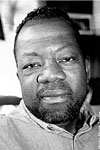In one of his few written harangues against the composite absurdity of his ethnic, racial, social, political and sexual lives, the late Detroit community actor, fiction writer and poet William Hogg summarized his ridiculousness—vis-à-vis the city in which he was born—thusly: “Let’s face it, Detroit ain’t made for a white faggot who thinks he’s black, regards his sexuality as important only in a political sense (but has been driven to try to make it more important), iter as unusual in the late 1970s except, perhaps, the insistence on “magic.” By which he meant, specifically, comic books, poetry, theater, the ways that each of these art forms points beyond, while tethered to, for a little longer, the human adventure. Come to think of it, that definition applies to people too, for what do we love in those we love except that which promises what can never be delivered—transcendence—even as the limitations of our words and bodies betray us to the earth that patiently awaits our return? Certainly this knowledge is evident in the words Bill left behind. For a couple of years after his death I tried to get those words into print with a publishing house but failed to do so. Perhaps the truth is that much of that work seems trapped, like the Detroit I left, in a once fertile past. Yet the work is better than a great deal that currently lines the shelves of the few remaining bookstores. Perhaps the truth is simply what one publisher wrote me: it’s difficult enough to publish the work of an unknown writer; to publish the work of an unknown writer posthumously is almost impossible. Still, I would like to imagine that one day what follows will have been merely a preface to a collection of his writings.
[ The Hogg Project ]
 Tyrone Williams teaches literature and theory at Xavier University in Cincinnati, Ohio. An experimental poet of a rare breed, Tyrone has authored four books of poetry, c.c. (Krupskaya Books, 2002) , On Spec (Omnidawn Publishing, 2008), The Hero Project of the Century (The Backwaters Press, 2009), Howell (Atelos, 2011) and a number of chapbooks including AAB (Slack Buddha Press, 2004), Futures, Elections (Dos Madres Press, 2004) and Musique Noir (Overhere Press, 2006). . .
Tyrone Williams teaches literature and theory at Xavier University in Cincinnati, Ohio. An experimental poet of a rare breed, Tyrone has authored four books of poetry, c.c. (Krupskaya Books, 2002) , On Spec (Omnidawn Publishing, 2008), The Hero Project of the Century (The Backwaters Press, 2009), Howell (Atelos, 2011) and a number of chapbooks including AAB (Slack Buddha Press, 2004), Futures, Elections (Dos Madres Press, 2004) and Musique Noir (Overhere Press, 2006). . .